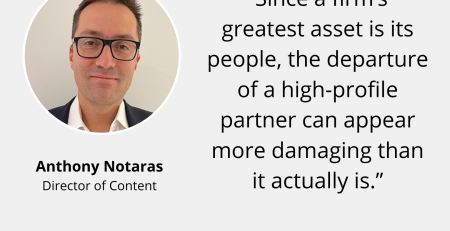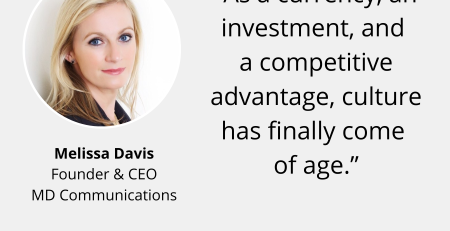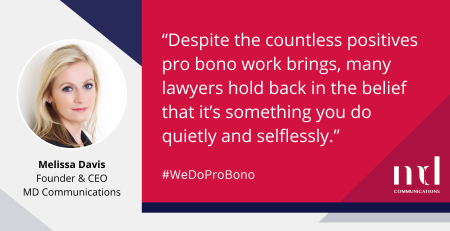Earth Day came and went this year with little fanfare from the professional services sector but should we be surprised, with energy bills and inflation soaring, asks our CEO and founder Melissa Davis?
There are multiple awareness days and campaigning events for professional services businesses to support – either as it fits with their values and purpose or simply as a chance to show support via social media.
Earth Day feels like one campaigning day the sector passed over. Maybe it’s fatigue at the ever-increasing number of ‘days’ – or maybe it’s a clear sign of the long road our sector still has to travel in embracing the climate crisis and the march to net zero.
It’s ironic when you consider that the call to action from the organisers of Earth Day was: ‘This is the moment to change it all’. Perhaps it wasn’t.
Choose your crisis
Or perhaps the current cost of living crisis and, in particular, the energy price crisis which has been heightened by war in Ukraine has, for now, outstripped the climate crisis. There are now so many crises in the news, consumers and businesses have a choice. It’s not a great place to be.
Indeed, we’ve begun to see law firms choose to make one-off payments to colleagues to help them with their energy bills as they soar way beyond normal levels.
So perhaps Earth Day this year felt less pressing. Maybe firms felt there were other more important concerns with the way 2022 has begun.
I’d argue this was the wrong call. I’ve written before about the importance of an ESG strategy and how current colleagues and future recruits will increasingly factor in their next employer’s commitment on issues like climate change.
In a recruitment market that is becoming more and more competitive every year, businesses that demonstrate genuine commitment have a better chance to attracting the next generation of talent they need to grow their businesses.
Net zero still the goal
It’s easy to get distracted. Just a fortnight ago, the Government announced the British Energy Security Strategy. If you looked at the headlines, nuclear grabbed most of the attention, alongside an acceptance of the need to use the UK North Sea more to ensure greater security of supply for the UK.
Net zero didn’t go away though. And it won’t.
Nuclear will take decades to come onstream. Oil and gas from the North Sea will be needed for the medium-term with 80% or so of the UK’s homes still powered by gas and businesses depending on gas especially for their power.
But the direction of travel is still towards net zero and that can’t – and won’t – change. From a macro perspective, the UK – and the world – will continue to increase its investment in the energy sources of the future: wind, solar, hydrogen as well as carbon capture.
And with that will come an increasing focus on what businesses are doing. Not just those in the energy sector but all of us – including increasingly the legal and professional services sector.
Mean what you say
This is where danger lurks. There will be firms who pay lip service to their progress on climate change. The odd tweet here, a web article outlining their skills in the key issues, aiming to attract clients as much as take real steps towards making their businesses more sustainable.
We are increasingly involved with advising firms on their ESG strategies, including their position on climate change. We always start from the same position: what are you doing now, how do you plan to be a net zero business and by when?
If that sounds a little scary, then it might be time to look at your plans – because increasingly, that’s how regulators and climate campaigners will look at sectors. Not at what they say but at what they actually do.
Targets make good headlines but they have to be achievable. The UN said at the end of last year that it was setting up a ‘greenwashing’ watchdog to check what firms said. The legal sector may not be in its crosshairs just yet but it will be.
The first quick wins firms could – and should – look at are fairly simple. How many charging points do you have available for your colleagues to charge an electric vehicle? These will become more and more popular very quickly now – already Volvo and Ford have said they’ll only produce EVs by the end of the decade.
And how many of your partners, as leaders in your business, drive EVs? Some of the biggest businesses in the country are shifting at pace towards an all-EV fleet. Should professional services firms be any different?
Of course, there are arguments around EVs and whether they are as green as people think. Ultimately however, it’s increasingly hard to argue that diesel SUVs in particular are greener so EVs offer some progress.
And what about your energy? If you own or are the sole tenant in your building, is your energy renewable? If not, why not and when could you switch to greener energy. Many energy firms would even work with you on a joint promotional piece so it could be win-win. Even if you’re just one tenant, can you influence the landlord?
Some may read this and think ‘yes but not just yet’. But if not now, when? It’s always easy to push things into next year or the next three-year plan but these are issues which can’t wait.
Clients will increasingly demand progress. Pitch documents will increasingly assess ESG credentials. Most importantly, clients will increasingly assess firms and make their choice based not just on what firms do but how they do it.
The cost of living crisis will be with us sadly for some time. The best firms will rightly support their colleagues through this.
But the sector can’t sleepwalk into a reputational crisis, accused of inaction and delay over the climate challenge. You could argue all of us are already running to catch up. Let’s hope by the time Earth Day comes around next year, we’ll all have much more upon which to report.
More information on reputation management.












